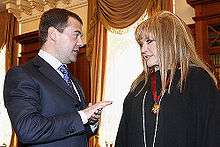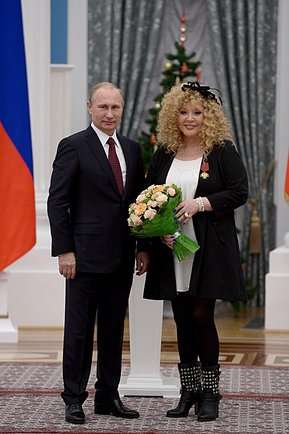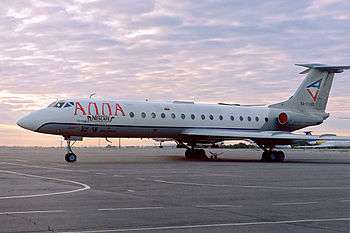Alla Pugacheva
| Alla Pugacheva | |
|---|---|
.jpg) | |
| Born |
Alla Borisovna Pugacheva April 15, 1949 Moscow, Russian SFSR, Soviet Union |
| Alma mater | Russian Academy of Theatre Arts |
| Occupation | Singer, composer, actress |
| Years active | 1965-present |
| Height | 5 ft / 1.62 m |
| Religion | Russian Orthodoxy[1] |
| Spouse(s) |
|
| Children | 3 |
| Parent(s) |
Boris Mikhailovich Pugachev (father) Zinaida Arkhipovna Odegova (mother) |
| Awards |
|
| Signature | |
 | |
Alla Borisovna Pugacheva (Russian: Алла Борисовна Пугачёва; sometimes transcribed in English as Pugachova, Russian pronunciation: [pʊɡɐˈtɕɵvə]; born 15 April 1949), is а Soviet and Russian musical performer. Her career started in 1965 and continues to this day. For her "clear mezzo-soprano and a full display of sincere emotions",[2] she enjoys an iconic status across the former Soviet Union as the most successful Soviet performer[3][4] in terms of record sales and popularity.[lower-alpha 1]
She became a Meritorious Artist of the Russian SFSR in 1980, People's Artist of the Russian SFSR in 1985 and People's Artist of the USSR in 1991. She represented Russia in the Eurovision Song Contest 1997.[5]
Professional biography
Pugacheva was born to Boris Mikhailovich Pugachëv and Zinaida Arkhipovna (née Odegova) Pugachëv in Moscow, on 15 April 1949.[6] In 1956, she enrolled in music school №31, and attended the Ippolitov-Ivanov music college. She went on to study at school №496, finishing her studies there in 1964. She then studied in the choral-conducting department of the college. Pugacheva recorded her first track "Robot" in 1965, for a morning programme on Radio Yunost.
Pugacheva finished college in 1966 and subsequently toured with the group Yunost' (Youth) in Western Siberia. The following year she began working as a piano accompanist at the State Circus Musical college. She provided the leading vocals to a number of bands, including Novy Elektron (New Electron), part of the Lipetsk State Philharmonic Society, in 1966, Moskvichi (Muscovites) in 1971, Oleg Lundstrem's band in 1972-73, and Vesyolye Rebyata (Merry Folks) in 1974-75. She recorded songs throughout that period for numerous movies.[7]
In 1974, she came in 3rd place in the All-Union competition of musicians. In 1975, she received the Grand Prix of the international contest "Golden Orpheus" performing the song "Harlequin" by Emil Dimitrov. The Amiga label released her winning song as a single in East Germany. Subsequently in Bulgaria, the Balkanton label released the live recording of "Harlequin" from the festival as a single. One year later, Pugacheva returned to the "Golden Orpheus" to perform a concert outside the competition. The Balkanton released the live tracks as Pugacheva's first album Zolotoy Orfey 76. In that same year, Pugacheva recorded a number of songs for the musical drama-comedy The Irony of Fate as the singing voice of Nadja, the female protagonist.
 |
"Zhenshchina, kotoraya poët"
Sample from "Zhenshchina, kotoraya poët" (The Woman Who Sings), title track of Pugacheva's most popular musical film |
| Problems playing this file? See media help. | |
The Woman Who Sings

Pugacheva went on to work on the musical film Zhenshchina, kotoraya poyot (The Woman Who Sings) in cooperation with the band Ritm (Rhythm) in 1977. She played the leading lady, a famous pop singer who sacrifices her personal life for her career. The soundtrack, which was co-written by Pugacheva and composed of pop songs, culminated with the dramatic title ballad "Zhenshchina, kotoraya poyot". The Soviet audience, regarding the film as autobiographical,[8] brought the soundtrack to reach record audience of the year in 1979, as it was bought by 55 million people.[9] The soundtrack was first released in 1977 as part of the double album Zerkalo dushi (Mirror of Soul), which was a collection of her songs from 1975–77. The Victor label released a collection album Alla Pugacheva in the same year in Japan. In 1978, performing the song "Vsyo mogut koroli" ("Kings Can Do Anything"), Pugacheva received the Amber Nightingale prize at the Sopot International Song Festival which at the time meant automatically winning the Grand Prix of the Intervision Song Contest.[10] In 1980, the Kansan label of Finland released her above listed works as the compilation album Huipulla (At the Top). Tonbandausnahmenkompanie Bayer GmbH did the same in West Germany, releasing Alla Pugachova.
Stockholm (1980–1988)
During the 1980s, Pugacheva was a frequent visitor to Stockholm. She started out with multiple guest appearances on the popular Swedish radio show Galaxen (April 1980 year) conducted by Jacob Dahlin, and later frequently appeared on his TV-show Jacobs Stege (Jacob's Ladder). Dahlin and Pugacheva used to perform duets, such as "Superman" where Dahlin sings as the title character. In Stockholm, Pugacheva recorded an album in English, released by the World Record Music label in Sweden as Watch Out and by the Melodiya label in the Soviet Union as Alla Pugacheva in Stockholm.
Artistry
In the late 1970s, Pugacheva became one of Russia's most beloved artists for her "clear mezzo-soprano and a full display of genuine emotions".[11][12]
Legacy
Pugacheva is currently a judge on Russia's version of the British X-Factor "Factor A." She is the main judge and therefore the most important. She has the ability to give the most points.

Pugacheva's most notable title is "People's Artist of the USSR", the highest honour that could be bestowed to a musical artist in the state, awarded to her in 1991. While the lesser titles of "Accomplished Artist of the Russian SFSR", and "People's Artist of the Russian SFSR" had been already awarded to her in 1980 and 1985 respectively, the government was hesitant to award her its highest honour, reportedly largely because of statements and actions on her part that were inconsistent with the Party's agenda. At the same time, she grew to represent the government-endorsed pop culture that was forced upon people.[13] Pugacheva listed in the Russian Encyclopedia (2005).[14]
President of Russia Dmitry Medvedev awarded Pugacheva the 3rd Degree Order of Merit for the Fatherland on her 60th birthday (15 April 2009).

Honours and awards
- Orders
 Order of Merit for the Fatherland 2nd class (15 April 1999)
Order of Merit for the Fatherland 2nd class (15 April 1999) Order of Merit for the Fatherland 3rd class (15 April 2009)
Order of Merit for the Fatherland 3rd class (15 April 2009) Order of Merit for the Fatherland 4th class (17 April 2014)
Order of Merit for the Fatherland 4th class (17 April 2014) Mesrop Mashtots Order (Armenia, 26 September 2009)
Mesrop Mashtots Order (Armenia, 26 September 2009) Order of Friendship (Azerbaijan, 4 September 2009)
Order of Friendship (Azerbaijan, 4 September 2009)
- Titles
- People's Artist of the USSR (20 December 1991)
- People’s Artist of the RSFSR (1985)
- Honoured Artist of the RSFSR (1980)
- Honorary citizen of the city of Makhachkala (2006)
- Awards
- State Prize of the Russian Federation (7 June 1995) – For outstanding contribution to the development of literature and art
- Belarus president award Through Art - to Peace and Understanding (7 July 2006)
| Awards | ||
|---|---|---|
| Ovation | ||
| Preceded by |
Living Legend Award 1994 Alla Pugacheva |
Succeeded by 1995 Joseph Kobzon |
Private life
In 1969, she married Lithuanian circus performer Mykolas Orbakas, and in 1971 she gave birth to a daughter, Kristina Orbakaite, who is also a popular singer.[15] Pugacheva divorced Orbakas after four years of marriage in 1973. She married film director Alexander Stefanovich in 1976, and starred in several of his movies. The union was dissolved in 1980, after drawn-out legal proceedings on the division of property, with Pugacheva's luxurious flat in Patriarshy Ponds, Moscow being the heart of the debate.
In 1985, Pugacheva married producer Yevgeniy Boldin, with whom she had numerous professional collaborations. She had a working and romantic relationship with a young musician and singer, Vladimir Kuzmin during this period. In 1993, she divorced Yevgeniy Boldin stating that their professional lives interfered too much with their personal life.
In 1994, she married a pop singer, Philipp Kirkorov, almost two decades her junior, and of Bulgarian-Armenian and Russian descent. Their divorce was announced in November 2005.
On 23 December 2011, Alla Pugacheva and Maxim Galkin married.[16] The couple has twins delivered by a surrogate mother.[17][18]
In March 2014 Pugacheva signed a petition against the alleged persecution of Andrei Makarevich for his pro-Ukrainian views, meanwhile she expressed support for the Russian annexation of (the Ukrainian region of) Crimea that same month.[19]
Discography
Original solo albums
| Year (P) | Number | Original title | Title in English | Format | Label, country |
|---|---|---|---|---|---|
| 1976 | Золотой Орфей 76 | Golden Orpheus 76 | Live LP | Balkanton, Bulgaria | |
| 1977 | C60 09799-2 | Зеркало души | The Mirror of the Soul* | Double LP | Melodiya, USSR |
| 1979 | C60 11975-6 | Арлекино и другие | Harlequin and Other Songs* | LP | |
| 1980 | C60 14429-0 | Поднимись над суетой | Be Beyond a Fuss of Life* | LP | |
| 1980 | C60 14935-6 | То ли ещё будет | Something's Still to Come* | LP | |
| 1982 | C60 17663-6 | Как тревожен этот путь | How Disturbing Is This Way* | Double | |
| 1985 | C90 21357-8 | Ах, как хочется жить | Ah, How I Want to Live | LP | |
| 1985 | WRM LP01 | Watch Out | Watch Out | LP | World Record Music, Sweden |
| 1986 | C60 24717-8 | ...счастья в личной жизни! | ...and Happiness in Private Life* | LP | Melodiya, USSR |
| 1986 | C60 25059-0 | Пришла и говорю | I'm Here Talking to You* | LP | Melodiya, USSR |
| 1990 | SUCD 60 00122 | Алла | Alla | CD | Melodiya, USSR |
| 1991 | 10191-40191 | Рождественские встречи 1990 | Christmas meetings 1990 | 2LP | Russian disc, USSR |
| 1992 | STEREO R60 00887 | Рождественские встречи 1991 | Christmas meetings 1991 | 2LP | Russian disc, Russia |
| 1995 | SZCD0475 | Не делайте мне больно, господа! | Don't Hurt Me, Gentlemen | CD | Soyuz, Russia |
| 1998 | Ex 98073 | Да! | Yes! | CD | Extraphone, Russia |
| 2001 | АБП 0037 | Речной трамвайчик | River Tram | CD | Alla, Russia |
| 2002 | АБП 0038 | А был ли мальчик | Was There a Boy? | CD | Alla, Russia |
| 2003 | АБП 0055,
МТ 702909-288-1 |
Живи спокойно, страна! | Live Peacefully, My Country! | CD | Alla & Monolit, Russia |
| 2008 | АБП 0055,
МТ 702909-288-1 |
Приглашение на закат | Invitation to a Sunset | CD | Alla |
* Official English title.
Other albums


- 1978 Alla Pugacheva (released in Japan) – compilation
- 1978 Ala Pugachova. Ogledalo na dushata (released in Bulgaria) – compilation
- 1979 Alla Pugacheva i Iosif Kobzon – split
- 1980 Diskoteka A – instrumental remixes
- 1980 Alla Pugatšova. Huipulla (Alla Pugacheva. At the Top; Kansan, Finland)
- 1980 Alla Pugačevova. Zrcadlo duše (Czech version of Zerkalo dushi)
- 1981 Alla Pugačova (Czech version of To li eshche budet...)
- 1981 Alla Pugatšova. Tähtikesä (Alla Pugacheva. Starry summer; Kansan, Finland)
- 1982 U nas v gostjakh maestro (Our Guest is the Maestro) – live / split
- 1982 Parad Planet – split
- 1983 Million Roz (released in Japan) – compilation
- 1983 Alla Pugačova. Dávná píseň (a Czech compilation)
- 1984 Alla Pugacheva – Soviet Superstar. Greatest Hits 1976–84 (World Record Music, Sweden) – compilation
- 1985 Alla Pugacheva – Soviet Superstar vol.2 (released by the World Record Music in Finland) – compilation
- 1988 Pesni vmesto pisem (Songs Instead Of Letters) – split with Udo Lindenberg
- 1989 Paromshik – (Ferryman) (Finnish release of Rechnoy paromshchik)
- 1991 Alla (Ritonis, Riga)
- 1994 Veryu v tebya (I Believe In You) – compilation
- 1995 Put' zvezdy (The Path of a Star) – compilation
- 1996 A 13 CD compilation of songs previously released only on LP and MC
- 1996 Poët Alla Pugacheva (Alla Pugacheva Sings; songs by Aleksandr Zazepin) – compilation
- 1997 Dve zvezdy (Two Stars; with Vladimir Kuzmin) – compilation / split
- 1998 Syurpriz ot Ally Pugachevy (Surprise from Alla Pugacheva) – tribute
CD singles
- 1997 Primadonna (Eurovision 1997)
- 2000 Bely sneg (White Snow)
- 2000 Madam Broshkina
- 2002 Eto Zdrashalo pazhaluista' (It's Love)
There is an unknown number of single and EP releases published all over the world.
Films and TV appearances
- 1978 Teatr Ally Pugachevoy, Estonian Television
- 1978 Zhenshchina, kotoraya poët (The Woman Who Sings), Mosfilm
- 1981 Lyubovyu za lyubov' (Love For Love) Mosfilm
- 1984 Vstrechi s Alloy Pugachevoy (Meetings with Alla Pugacheva), USSR TV
- 1985 Prishla i govoryu (I Came and I'm Speaking), Mosfilm
- 1985 Sezon chudes (Season of Miracles), Odessa Film Studio
- 1989–2002 Rozhdestvenskie vstrechi (Christmas Meetings), USSR TV, Ostankino, Public Russian Television, Russian State Television
- 1995 Zhdi i pomni menya (Wait for Me, Remember Me), Public Russian Television
- 2003 Za dvumya zaytsami (Chasing Two Rabbits)
See also
- Best selling music artists – World's top selling music artists chart.
Notes
- ↑ Encyclopædia Britannica repeats a claim on its features website that Pugacheva has sold around 250 million records. Other internet sources claim figures from 75 million to 250 million records, though there is no official source for this information.
References
- ↑ Pugacheva and Galkin baptized children in the Castle
- ↑ "ВРЕМЯ Z" – журнал для интеллектуальной элиты общества [Time Z – Journal for the intellectual elite of the society] (in Russian). 13 November 2006.
- ↑ Alison Smale (28 February 2000). "A Superstar Evokes a Superpower; In Diva's Voice, Adoring Fans Hear Echoes of Soviet Days". The New York Times. Retrieved 17 April 2012.
- ↑ Jon Pareles (25 September 1988). "Review/Music; Alla Pugacheva's Moody, Ardent Soviet Pop". The New York Times. Retrieved 17 April 2012.
- ↑ Всем шоу шоу. Archived from the original on 9 September 2012. Retrieved 5 December 2015.
- ↑ Alla Pugacheva. IMDb.com. Retrieved 27 June 2010.
- ↑ Collection of her songs from movies, russiandvd.com; retrieved 10 October 2013.
- ↑ «Женщина, которая поет»: кто такой Борис Горбонос? ["The Woman Who Sings": Who Is Boris Gorbonos?]. volgograd-trv.ru (in Russian). 17 April 2009. Retrieved 22 May 2009.
- ↑ Лидеры проката [Top bill]. Kinokultura.com (in Russian). Archived from the original on May 10, 2012. Retrieved 22 May 2009.
- ↑ Międzynarodowy Festiwal Piosenki Polskiej- Sopot Festival Archived January 2, 2007, at the Wayback Machine., pesnyagoda.by.ru; accessed 17 May 2015.(Russian)
- ↑ Alla Pugacheva biography ARTISTdirect.com
- ↑ :ВРЕМЯ Z" – журнал для интеллектуальной элиты общества [Time Z – Journal for the intellectual elite of the society] (in Russian). 13 November 2006. Retrieved 23 May 2009.
- ↑ Alla Pugacheva biography, artistdirect.com; accessed 17 May 2015.
- ↑ Profile, intermedia.ru; retrieved 8 June 2015.
- ↑ Celebrity and Glamour in Contemporary Russia: Shocking Chic
- ↑ "Алла Пугачева и Максим Галкин поженились (ФОТО)". Mail.ru. 26 December 2011. Retrieved 28 December 2011.
- ↑ "Pugacheva about Tymoshenko". UNIAN. 6 March 2009. Retrieved 6 March 2009.
- ↑ "Yulia Tymoshenko sang a song for Alla Pugacheva". UNIAN. 24 April 2009. Retrieved 24 April 2009.
- ↑ Pugachev and other leaders are asked to stop harassment by Makarevich Crimea, Ukrayinska Pravda (28 March 2014)
External links
| Wikimedia Commons has media related to Alla Pugacheva. |
- Russian Music on the net: Info on Alla Pugacheva with lyrics translated to English
- Alla Pugacheva discography at MusicBrainz
- Alla Pugacheva at the Internet Movie Database
- Alla Pugacheva at the Forbes (Russian)
- Videos of Alla Pugacheva's Concert in Kremlin
- Alla Pugacheva discography at Discogs
| Preceded by Philipp Kirkorov with "Kolibelnaya dlya vulkana" |
Russia in the Eurovision Song Contest 1997 |
Succeeded by Alsou with "Solo" |